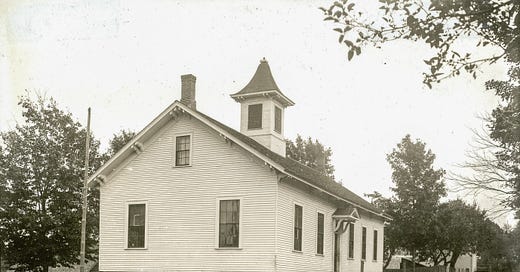FINNS: An Oral History of Finnish-Americans in New Hampshire’s Monadnock Region
Excerpted from FINNS: An Oral History... by Patricia Kangas Ktistes, 1997, all rights reserved.
Walter Aho
I went to high school in Ashby for two years until I got to be 16 and didn’t have to go to school anymore. And I said, “Logically looking at it, if I sit in school for two more years, I’m going to learn about photosynthesis and amoebas and all these things which no person would ever use in this life. And at the end of those two years, I will know next to nothing about rafter cuts or anything about construction. Whereas if I go to work, two years from now I will know carpenter work inside out and I’ll have some knowledge that’s useful. Why should I waste two years gathering up knowledge that is absolutely useless?”
So that’s what I did. I quit school and went to work for Seppala & Aho Construction. My father asked me, “Did Marty [Seppala] and Hjalmar [Aho] both graduate from high school?” And I said Hjalmar did, but Marty didn’t. He said, “There you go. The brain and the brawn.” Then he took me to see his uncle Waino Aho and Waino’s son Norman. Waino and Norman were both carpenters and my father asked Waino, “Walter wants to quit school and go into carpenter work. What would you advise him?”
Waino, being a very good uncle, said, “I don’t suggest that at all. I think it’s important that you go to school.” And Norman verified it and said all the things my Dad wanted him to say, which didn’t affect me in the least.
During my sophomore year, Miss Wilder was a good English teacher in the Ashby School, but she taught us World History that year and she was terrible; she had no control over the class, no discipline. She’d stand at the door and when the bell rang: the kids would go by her. She could be in the middle of giving the homework assignment, it didn’t matter. They’d push her aside. I learned nothing. I remember her standing up front and talking about Neanderthal man. How we came from the monkeys.
She said to the class, “Don’t you even feel more comfortable when you stand like this?” And she was trying to tell us that our natural posture was more like an ape’s; that it was only social pressure that makes us stand more erect. I listened to that stuff and said, Oh, brother. I had another teacher for geometry and science who wasted a whole year for me. I went through geometry and never learned the difference between a sine, a cosine, and a tangent. I can’t even accidentally do that. I mean, that’s my cup of tea algebra, geometry—logical things. And this guy: all he did was flirt with the more mature girls in the classroom. The greatest injustice any school system can do to a student is put them for one year with a teacher who cannot teach. Because they will never repeat that subject. What they lose they will never regain. They still do it. Absolutely. I had gotten straight As on my finals in the freshman year. And for my first two finals in the sophomore year, I got As.
The principal took me in his office and said, “If you get As and Bs on the rest of your finals, I can probably get you a scholarship.” I said, “Okay. If I can somehow squeak out As and Bs on the next three exams, I’ll stay in school and if I don’t, I’m out.” I got a C on one of them and that was it. If I would have had good teachers or some motivation it wouldn’t have taken much to keep me in school. But I was bored stiff. They got up there and took a boring subject and made you read and paraphrase it; I was climbing the walls. My idea in teaching is to get a person interested in some aspect. Say if you’re teaching history. Get them interested in a people. A culture. And kind of makethem live through it: they would love it. I remember in geography, they’d ask [deadpan]: “What products are exported from Argentina?”
I’d always raise my hand, “Copper, iron, grain products...” I’d get probably three right because every country exports something. What good is this?
But that’s why I quit school and I’m not sorry. I can’t stand structured classroom atmospheres. I just have no capacity for it. I went to work as a carpenter. I remember getting my first paycheck: $27. I went down to Chubby’s supermarket and cashed it and I had so much money in my wallet that I didn’t know what I was going to do with it all.




There is some validity to what Walter said. Good teachers with control of the class is critical. However, Walter's uncle is also right. Defining what education is requires more space than this comment box will allow. High school plus some vocational training or apprenticeship is all many citizens need. I have respect for a good mechanic or electrician. I have PhD electrical engineer friends who can't wire a house. However, one of them (we were in graduate school together and shared a house) in the 1960s proved that ultrasound could be used to monitor cardiac volumes and other structures in the body. He and another PhD engineer sold there company to Siemens and started a consulting business and I just checked online to find them still business. I was surprised because they don't need to work. They're doing what they enjoy doing. Also 'education' is a not a process confined to a school building.
Bill Gates and Michael Dell are college dropouts. Mike Rowe has a nice balanced view of this. 'How America Works' is well worth watching.